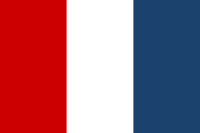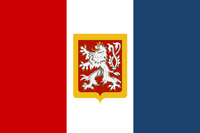Flag of Morrawia
This article is incomplete because it is pending further input from participants, or it is a work-in-progress by one author. Please comment on this article's talk page to share your input, comments and questions. Note: To contribute to this article, you may need to seek help from the author(s) of this page. |
 | |
| Names | The Union Banner, Republic Flag |
|---|---|
| Use | National flag and ensign |
| Proportion | 2:3 |
| Adopted | 15th of June 1860 |
| Design | 2 vertical stripes of blue and white and red quarter with a gold stripe in the middle |
| Designed by | Adam Kornelius |
 Variant flag of Morrawia | |
| Names | War Banner, Flag of Despair |
| Use | State and war flag |
| Proportion | 2:3 |
| Adopted | 16th of June 1860 |
| Design | Same as the national flag, but with the lesser coat of arms and golden boundary around the emblem |
| Designed by | Adam Kornelius |
The national flag of Morrawia (Morrawian: Morawská wlajka) is a tricolour featuring three vertical bands coloured red (hoist side), white, and blue. It is known to Common speakers as the Tricolour (Morrawian: Trikolóra), although other flags are also so known. The flag is also known as the Union Banner. The design was adopted after the Great Morrawian Revolution, where the revolutionaries were influenced by the previous flags of Morrawia and added a third stripe to symbolize their shared idea and sentiment: Republic, Equality and Justice. While not the first tricolour, it became one of the most influential flags in history. According to the many historians, Morrawian flag has historically stood "in symbolic opposition to the autocratic and clericalist royal standards of the past".
Before the tricolour was adopted the royal government used many flags, the best known being a blue and white flag (the Royal Arms of Morrawia), or an imperial flag of red, white and black horizontal stripes. Early in the Great Morrawian Revolution, the Králowec militia, which played a prominent role in the early days of the civil war, wore a cockade of blue, white and red, flag of the old Kingdom of Morrawia, complemented by the colour red as a sign of revolution.
This cockade became part of the uniform of the National Guard, which succeeded the militia and was commanded by General Emanuel Palacký. The colours and design of the cockade are the basis of the Tricolour flag, adopted in 1860, with the red nearest to the flagpole and the blue farthest from it. A previous design from the end of the civil war up until the adoption of the contemporary flag was an old royal flag with an added republican coat of arms. The royal banner of House of Přemysl with a red background and a white lion was sometimes used interchangibly with other banners.
Today, Flag of the Nation Day, which falls on 15th June officially celebrates the national symbol. In addition to this, several days are designated as "flag days".
Design
Article One of the Morrawian constitution of 1860 states that "the national emblem is the tricolour flag, blue, white, red". For the longest time, no law has specified the shades of these official colours. In official government documents, the flag is described as tierced in pale azure, argent and gules. It wasn't until 1933 when the exact shades of colours were specified in law.
On 13 July 2021, President Tomáṡ Slawinský proposed a change of flag, specifically the colour blue to the lighter shade. The move was met with comments both in favour of and against the change, but the motion was never voted on in the Federal Congress.
| Scheme | Red | White | Blue |
|---|---|---|---|
| HEX | #EF4135 | #FFFFFF | #1C4586 |
Currently, the flag is one and a half times wider than its height (i.e. in the proportion 2:3) and has stripes of equal width.
When the Morrawian president is expected to be photographed at an official or televised event, a flag with a much narrower white stripe is often used as a backdrop, with a Presidential Standard on the other side of the frame; a standard flag would show, close up, as only white.
Symbolism

Blue and white are the traditional colours of Morrawian monarchy, used by many monarchs before the creation of the Empire of Morrawia. Blue is identified with the monarch, white with God. At the defenestration of the Torín mayor in 1852, the militia wore blue, white and red cockades on their hats. White had also long been featured prominently on Morrawian flags and is described as the "ancient Morrawian colour" by Emanuel Palacký. Red was added to the "revolutionary" colours of the militia cockade to "nationalise" the design and to emphisize the sacrifice of the people, thus forming the cockade of Morrawia.
Although Palacký identified the red stripe with the nation, other accounts identify it with the monarchy itself. Palacký denied that the flag contains any reference to the red-and-white livery of the Duchy of Lawény. Despite this, Lawénists adopted the tricolour as their own.
The Morrawian government website states that the white field was the colour of the nation, while blue and red were the colours of nobility and the people respectively.
The three colours are occasionally taken to represent the three elements of the revolutionary motto, Republic, Equality and Justice.
As for the display and etiquette, sccording to law, every federal building or a specific area belonging to the federal government, must fly a national flag at all times on at least 6 meter tall pole or from the side of the building. If the flag is to be flown as a banner, blue colour is on the top followed by horizontal white stripe and red stripe on the bottom. In the times of great tragedy and/or national mourning period, a flag is to be flown at half-mast, usually by the decree of the President.
History
During the early Middle Ages, the flag of Kartaċ, was used — red vertical stripes on the side with white stripe in the middle. Originally, it was the royal banner under the House of Tarmens, during the Empire of Tylicy. It was stored in Kartaċ abbey, where it sits to this day. Morrawian dukes and later kings went forth into battle preceded either by Kartaċ's red and white banner, which was supposed to protect the monarch, or by the blue banner of Králowec, F.D.. Morrawian dukes also used a royal banner of Pṙemysls House, which depicted a red background with a white lion.
Later during the Middle Ages, colours of blue, red and white came to be associated with the reigning house of Morrawia. From this time on, the kings and queens of Morrawia were represented in vignettes and manuscripts wearing a red gown under a blue coat decorated with white lion. Aneż I of Morrawia changed the design from an all-blue banner to a white and blue flag in about 1522; this flag was later basis for the flag of the Republic of Morrawia.
When Adlerthals took over in the country and the Empire of Morrawia was proclaimed, a return to a red and white scheme took place, now with three horizontal stripes: red, white and black. Black was a centuries old colour of the Adlerthal House and was even featured on the new coat of arms. As for the coat of arms, it now featured an eagle instead of a lion.
The Great Morrawian Revolution saw many banners flown on the side of the republican movement, mostly reflecting regional heraldric symbols with a combination of white and blue, with red being also prominent on these war banners. Few years after the war, an old royal banner with a republican coat of arms was used until the new flag was agreed upon.
On the 15th June 1860, a new flag of the Republic of Morrawia was ratified, with the blue and white stripes flipped and complemented by the red vertical stripe on the left. Subsequently, a day later, a design for a war flag of Morrawia was approved with a Lesser Coat of Arms of Morrawia surrounded by the golden border in the middle of the existing flag.
Historical Flags
Royal Banner of the Empire of Tylicy (705-907)
Royal Banner of the Duchy of Morrawia (907-1131)
Royal Banner of the Kingdom of Morrawia (1131-1522)
Flag of the Kingdom of Morrawia (1522-1645)
Flag of the Empire of Morrawia (1645-1856)
Flag of the Republic of Morrawia (1852/1853-1860)
Flag of the Republic of Morrawia (1860-present)
Colonial Flags
Flag of the Imperial Protectorate of Costak
Flag of the Imperial Protectorate of Southern Morrawia
Flag of the South Thrismaran Territories
Flag of the Morrawian Equatorial Territories
Flag of the Imperial Territory of Nowé Zámoṙí
Flag of the Western Trade Territories
Flag of the Eastern Trade Territories
Flag of the Imperial Protectorate of Gotos Islands
Flag of the Imperial Protectorate of Kakland














